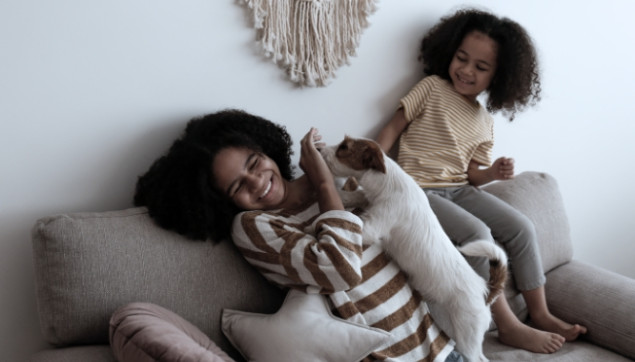How to find your perfect dog match

Last updated on 5th January, 2024 at 12:43 pm
Whether you’re thinking of adopting your first dog, or adding to your ever-growing four-legged family, it’s important to consider your future fur baby’s unique characteristics. Each breed is different and has slightly different characteristics.
Amanda van der Walt, a registered animal behaviouralist at Canine Companion, strongly suggests doing breed research before you adopt. So, before you ‘swipe right’ on your canine match, see which one would be right for you with this guide:
Match #1: a dog for an active family
Do
If you (or your family) enjoy the spoils of nature, and spend most weekends discovering new hiking trails, look at adopting a breed that can keep up with your active lifestyle. Van der Walt recommends breeds such as the Africanis, German shorthaired pointer, Irish setter, Hungarian Vizsla or German shepherd – to name a few. “They are near impossible to tire with an average walk, and usually enjoy running, trailing and agility training,” she says.
“It’s best to look at an individual dog’s characteristics,” adds Nicole Nel, an in-house animal behaviourist at the Cape of Good Hope SPCA. “Some breeds are more ‘sporty’ and require breed-specific outlets for running, chasing or playing fetch, and may find more enjoyment in hiking.”
Don’t
“No healthy socialised adult dog is likely to object to some fun and daily exercise,” says van der Walt. However, Nel adds that some small short-muzzled/flat-faced dogs (brachycephalic) like pugs, Boston terriers and bulldogs have difficulty breathing and may not be physically capable of long hikes or keeping up with a highly athletic family.
Match #2: a dog for a less active family
Do
If your family has a less active lifestyle, Nel suggests adopting toy breeds like loyal Maltese poodles, an ‘easy-going’ mixed breed or a mature dog. “Mature adult dogs most often are calmer and are fine with less physical exercise,” she adds. Though, if you can commit to a daily walk, then it broadens the range of breed you can select, says van der Walt. “Dogs who are scared on the leash, who nervously pull, or bark at other dogs while on walks, should be professionally leash-trained. This would make walks less stressful for both you and the dog,” she adds.
Don’t
“Avoid canines that require a healthy amount of mental and physical stimulation, like collies, Labradors, pointers, shepherds, spaniels and some terriers,” suggests Nel. They become easily frustrated when their needs aren’t met, and you’ll run the risk of sacrificing your couch, excessive boredom barking, or digging as a means to fulfil their needs, she adds.
Match #3: a dog for a young working professional or couple
Do
Be realistic about the type of lifestyle you have. For an individual with a blossoming career and a demanding social life, chances are you’ll find it challenging to keep a dog stimulated in your absence. You could opt for low-energy breeds like basset hounds, bichon frises, bulldogs, chow chows and Clumber spaniels. “You should focus on what you can do to keep them stimulated and fulfilled,” says Nel.
Don’t
Nel recommends steering clear of young puppies or even teenage dogs. “They should not be left unattended for lengthy periods. This would be detrimental to their emotional welfare and development,” adds Nel.
Are your fur babies part of your estate? Here’s how to ensure that they aren’t left high and dry when you pass away.
Match #4: a dog for a senior citizen
Do
Find a friend in a hound breed such as a basset. “They would much prefer snoozing all day in a plush bed over exercise, although a regular relaxed walk should be on the schedule for all healthy adult dogs,” says van der Walt. “Maltese poodles, Pekinese, Havanese and Shih Tzu make favourable options, too.”
Don’t
Nel urges you to avoid large breeds like a giant, bouncy adolescent great dane or feisty, fast-on-its-paws Terrier. “It would be best to look at the canine’s individual temperament, training history, size or age,” she notes.
Match #5: a dog for a family with young kids
Do
When adding a new puppy or dog to your family, it can be difficult to find the best match. Van der Walt recommends adopting a companion such as a beagle, Labrador Retriever, golden retriever or Maltese poodle.
Don’t
In order for children and dogs to live harmoniously together, it’s important for dogs to be socialised with children, van der Walt says. She recommends avoiding large boisterous dogs if you have smaller children.
Match #6: a dog for a family with other dogs
Do
It’s important to ensure that the next dog you welcome into your family gets along with other animals. This can lower the risk for aggression, territorial issues or other unpleasant scenarios. “The best match for a multi-pet household would be a Labrador, beagle, Cardigan Welsh Corgi, Border collie, Goldendoodle, basset hound or Cavalier King Charles Spaniel,” advises van der Walt. “It’s important to note that healthy interaction between dogs depends on their individual socialisation level, not only their breed.”
Don’t
If your existing dog, or the dog you’re planning to adopt, is not socialised, it may not get along with other dogs. This is why it’s best to contact an animal behaviourist to find out if the breeds you have in mind are compatible.
“Adopting an adult dog from a trusted animal shelter has many perks,” says van der Walt. “They are usually able to provide a brief history of the individual dog (regardless of breed), like whether they adapt well to other dogs, or are good with kids.”
Want to learn more?
We send out regular emails packed with useful advice, ideas and tips on everything from saving and investing to budgeting and tax. If you're a Sanlam Reality member and not receiving these emails, update your contact details now.
Update Now







